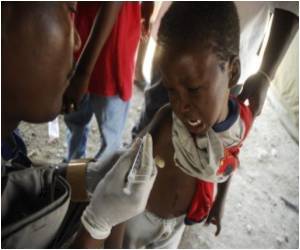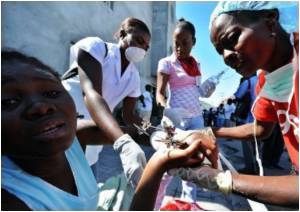
In Arcahaie, a small coastal town south of the outbreak's epicenter in the central Artibonite River region, 24-year-old Jacklin Anore lay on a bed in a darkened room of the Nicolas Armand hospital with a bucket by his side.
Barely able to raise his head, hooked up on a rehydration drip, he intermittently spat into a rusted bed pan and whispered thanks to the nurse who poured water over his head.
Patients have died here, but as in the case in Saint-Marc further north where most of the ill have flocked, doctors say the number of new cases is easing.
Signs urging residents in Port-au-Prince to clean their hands and take care with drinking water appeared in recent days, as the government seeks to keep the epidemic from reaching crowded urban areas, and the tent camps that have housed hundreds of thousands of people since the disastrous January earthquake.
Doctors Without Borders (MSF), which has eight facilities open to cholera infections in Artibonite and around the capital, said that despite the fewer deaths the need for vigilance remains.
Advertisement
An isolation unit has been established there for the most severe cases, but the aid group said fewer and fewer patients were arriving in such dire condition as before.
Advertisement
"It suggests that people are taking precautions and that there is a greater understanding in the community of the need to maintain strict hygiene and to seek medical assistance at the first sign of symptoms."
So far, the Americas' poorest country has managed to avoid the nightmare scenario of the epidemic taking hold in the unsanitary tent cities that cling to the hilly slopes of Port-au-Prince.
They sprung up after large parts of the capital and other nearby towns were flattened by the 7.0-magnitude quake that killed a quarter of a million people and displaced 1.3 million.
As the cholera toll climbed, Haiti's more prosperous neighbor, the Dominican Republic -- with which it shares the Caribbean island of Hispaniola -- tightened up border security to keep the disease at bay.
Officials in Santo Domingo said entry into the country from Haiti would be severely restricted, and border security increased. Later Tuesday officials in the neighboring country reopened markets on the border after establishing "sanitary controls" in the region.
In Geneva, World Health Organization spokeswoman Fadela Chaib said more cholera cases would be found but urged the Dominican Republic to keep the border open.
"There is no need to close the borders or restrict travel or trade because a neighboring country has cholera. This is what we say for all cholera outbreaks worldwide."
Aid agencies meanwhile stepped up efforts to educate Haitians about the risks and treatment of the disease, using local radio stations and text-messages about hygiene precautions.
Haitian officials said Monday they believed the outbreak had been contained and was limited to central areas near its believed source on the Artibonite River.
But a UN statement quickly tempered any optimism by warning that a nationwide outbreak infecting tens of thousands of people was still a distinct possibility.
"We are particularly concerned about Port-au-Prince and those in the slum areas as well as in the camps, but we are also preparing for outbreaks in the rest of the country," said Nigel Fisher, UN Humanitarian Coordinator in Haiti.
Living conditions in the camps, where pools of human waste lie in areas where people bathe, do laundry and share meals, are ideal for cholera to thrive.
The disease, which is primarily transmitted through contaminated food and water, can fatally dehydrate a victim in just hours.
Five cholera cases were confirmed at the weekend in the capital, but UN officials said those people traveled in from outside and were quickly diagnosed and isolated.
Source-AFP












